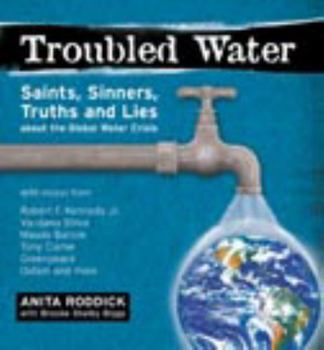Troubled Water: Saints, Sinners, Truth and Lies about the Global Water Crisis
To get a glass of water, a third of humanity turns on the tap. The rest improvises. The number of people who die worldwide from lack of access to safe water is equivalent to an area the size of... This description may be from another edition of this product.
Format:Paperback
Language:English
ISBN:095439593X
ISBN13:9780954395933
Release Date:January 2004
Publisher:Chelsea Green Publishing Company
Length:144 Pages
Weight:0.88 lbs.
Dimensions:0.5" x 7.7" x 8.2"
Customer Reviews
3 ratings
Well-Presented Material
Published by Thriftbooks.com User , 18 years ago
I found this book to be a very compelling source of information about our Global water crisis. It presented information in formats that are very clear and to the point. It illustrates quite well the tug-of-war going on today between corporations that sell bottled water and/or soft drinks and the people of countries who desperately need that water at low prices. This book defines water's critical role in the network of the earth's resources and how clean water should be the right of all human beings, not a commodity purchased by corporations and sold at huge profits. A must read!
Truths, lies, and myths surrounding a range of water issues
Published by Thriftbooks.com User , 19 years ago
Anita Roddick is both an entrepreneur and an activist and in Troubled Water: Saints, Sinners, Truth And Lies About The Global Water Crisis, informatively surveys the issues involved in worldwide potable water availability, from the politics of water distribution and water quality to global warming and bottled water myths. Essays from Greenpeace, Robert F. Kennedy Jr. and others, outline truths, lies, and myths surrounding a range of world water issues.
Most amazing book series ever by a business person
Published by Thriftbooks.com User , 19 years ago
Troubled Water is part of an amazing library of books Anita Roddick, global entrepreneur and founder of Body Shop, has spent much of the last 3 years authoring and is publishing simultaneously. Troubled Water is likely to have extraordinary consequences for global corporations in the water and soft drinks industries. For years, this sector has been asked by poor countries to collaborate responsibly and not to try to take over water in countries where cumulatively a billion people already have no fresh water access. As the author of World Class Brands 15 years ago, and a marketer ashamed to agree with most of Naomi Klein's charges of how much badwill global marketing has needlessly compounded over the last decade and a half, it will need a heroic and deeply human response from the likes of Coca-Cola if it is to remain in top 10 global branding lists 5 years out. It is fitting that within days of the publication of Troubled Water, the president of the World Bank has declared a war on global poverty. Over in Britain, from where I submit this review, you can be assured that Water will be the main activist theme aligning 20000 concerned people converging for the European Social Forum (October 2004), and celebrating the Brazilian led launch of the International Free Water Academy. It is time the people of the world took back the branding of the humanity of water, and 2005 is a year jammed full of large scale change networking events, each of which will pay special tribute to water as a symbol of human freedom. Troubled Water is a book of our times, the start of an activepeace movement as well as with your and my god's blessings a whirlwind contributor to James Wolfesohn's war on poverty. It would be fitting to pay tribute to his and Anita's common sense of humanity and water with the way the World Bank declares our future's interdependence at every locality of the globe: "The big issue of our time is global security. At present, we view it mostly through the lens of Baghdad or Beslan. While we certainly have to deal with these and other immediate concerns, by far, the greatest potential source of instability on our planet today is poverty, and the hopelessness and despair that it brings to so many in our world. Sixty years ago, the world recognized the need to bring hope to the millions of people left in shattered nations after World War II, and the World Bank was created to help them rebuild their lives. Its mission today remains as critical as it was then, if not more so. It is in all our best interests to help countries that struggle with crushing poverty to take basic steps, such as getting boys and girls into school; preventing diseases like H.I.V./AIDS, malaria and diarrhea; protecting our forests and oceans; and removing obstacles to trade so that poor farmers can get their products to market. Helping poor countries develop in this way is not merely the right thing to do ( though, of course, it is): investing in development is the safe thin




